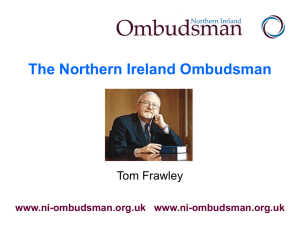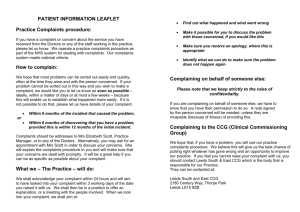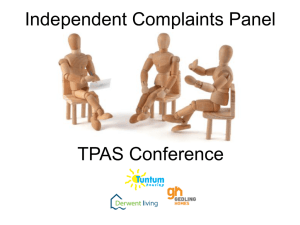The Ombudsman regards consumers` complaints as an important
advertisement
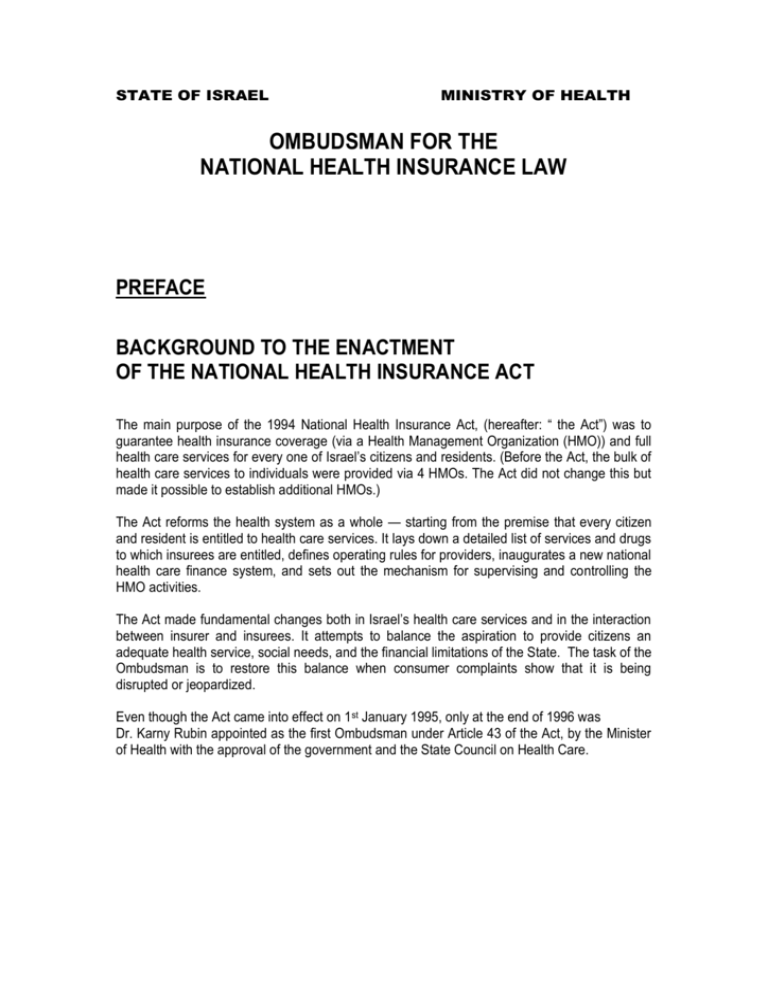
STATE OF ISRAEL MINISTRY OF HEALTH OMBUDSMAN FOR THE NATIONAL HEALTH INSURANCE LAW PREFACE BACKGROUND TO THE ENACTMENT OF THE NATIONAL HEALTH INSURANCE ACT The main purpose of the 1994 National Health Insurance Act, (hereafter: “ the Act”) was to guarantee health insurance coverage (via a Health Management Organization (HMO)) and full health care services for every one of Israel’s citizens and residents. (Before the Act, the bulk of health care services to individuals were provided via 4 HMOs. The Act did not change this but made it possible to establish additional HMOs.) The Act reforms the health system as a whole — starting from the premise that every citizen and resident is entitled to health care services. It lays down a detailed list of services and drugs to which insurees are entitled, defines operating rules for providers, inaugurates a new national health care finance system, and sets out the mechanism for supervising and controlling the HMO activities. The Act made fundamental changes both in Israel’s health care services and in the interaction between insurer and insurees. It attempts to balance the aspiration to provide citizens an adequate health service, social needs, and the financial limitations of the State. The task of the Ombudsman is to restore this balance when consumer complaints show that it is being disrupted or jeopardized. Even though the Act came into effect on 1st January 1995, only at the end of 1996 was Dr. Karny Rubin appointed as the first Ombudsman under Article 43 of the Act, by the Minister of Health with the approval of the government and the State Council on Health Care. THE OMBUDSMAN’S ANNUAL REPORTS The Ombudsman views these reports as a means of bringing her activities before three audiences — the public at large, service providers, and patients. It is her intention that these reports present decision makers at the Ministry of Health (MoH) and at Israel’s four HMOs with an up-to-date picture of the shortcomings and deficiencies discovered during the implementation of the Act and serve as the basis for the rectification of the problems. Notwithstanding the criticism she directs at difficulties arising out of the implementation of the National Health Insurance Act, the Ombudsman believes that the underlying ideology of the Act faithfully reflects Israel’s democratic nature and its social legislation agenda. The Act must be strengthened and solutions must be found to its deficiencies in order to protect its continued development and guiding role. The Ombudsman regards consumers’ complaints as an important source of information about the workings of the Act. She sees the complaints as enabling her to investigate and constructively criticize the Act’s implementation, which is the object of her work. The processing of a complaint is not limited to verification of that single complaint and a recommendation to rectify the particular shortcomings responsible. In situations where a complaint indicates faults with broader ramifications, the Ombudsman addresses the more fundamental cause too, so as to prevent future complaints on the same subject. The Ombudsman also views the process of investigation, verification and, where justified, assigning blame to a providing agency, as a mechanism for preventing further harm to the public, even if a particular grievance cannot be remedied at once. THE FIRST ANNUAL REPORT The first Annual Report reviewed and summarized the first year’s work of the Office of the Ombudsman with respect to the new National Health Insurance Act (January 1 st, 1997 through December 31st, 1997), which was the third year the Act was in effect. 1997’s main feature, was the large number of complaints dealing with HMO registration and membership, the result of furious competition between the HMOs to enlarge their membership. Other complaints related to non-provision of services and, in certain instances, raised questions as to the interpretation of the Act itself. SUMMARY OF THE FIRST ANNUAL REPORT In that first year, 1997, the Office of the Ombudsman processed and closed 20,132 objections (as they are termed in the Act) submitted against registration and membership in one of the four health management organizations. It also processed 1,328 complaints about non-provision of services and medications, 858 of which were processed to closure. Of the 858 complaints processed to completion, 489 were found to be justified, 27 were found to be unjustified and 342 could not be answered (they referred to matters beyond the purview of the Act, its regulations, and its compulsory Basket of Services and Medications, and hence beyond the authority of the Ombudsman). However, as these 342 complaints represented 2 insurees’ legitimate interests, it was decided to present them in the Report in a separate category. Breaking down the complaints by the HMO complained against, they distributed as follows: 517 (56%) complained against Clalit HMO, 178 (19%) against Maccabi, 125 (14%) against Leumit and 97 (11%) against Meukhedet (excluding 73 complaints about the enrollment of minors in an HMO). In addition, there were 209 complaints against the National Insurance Institute (the N.I.I. is the body overseeing all Israel’s social insurance system), 44 against the Ministry of Health; 29 against hospitals, and 56 miscellaneous others. Relative to the number of members in each HMO, the highest number of complaints was submitted against Leumit and Meukhedet in that order, and the lowest number of complaints, relative to membership size, against Maccabi and Clalit, in that order. Transfer from One HMO to Another Many insurees objected to their registration and membership in a particular HMO (the greatest number of objections, relative to HMO membership size, being against Leumit and Meukhedet in that order). This flood of objections resulted from a combination of two factors: first, ruthless exploitation by the HMOs of the provisions of the Act and its Regulations regarding registration with an HMO, and second, the position of the Ministry of Health, which was that nothing should be done on this matter until a formal amendment to the Act brought a comprehensive solution. The Ombudsman’s position was that interim solutions ought to be sought until the comprehensive solution arrived. The Ombudsman also recommended that the Act and its regulations be simplified and more frequent transfers from HMO to HMO be allowed. Failure to Provide Medical Information The Office of the Ombudsman received complaints from insurees who, utilizing their right to transfer from one HMO to another, met difficulties in obtaining information from their medical records in their former HMO. Most of the complaints in this regard were against the Clalit HMO. The Ombudsman’s position was that medical information required to provide a patient proper medical treatment cannot be withheld and that withholding such information is a violation of the Act. Failure to Provide Medical Services Another category of complaint came from insurees who had applied for transfer to another HMO and who, during the interim period before the transfer went into effect, were denied Guarantees to Pay (for services) and reimbursement from the HMO they were to leave. All the complaints on this matter were against Clalit. The Ombudsman’s position was that refusal to provide medical treatment, including Guarantees to Pay, to insurees who had registered for transfer to a different HMO, was a serious violation of the Act. Eligibility for Health Insurance Complaints on this matter, unlike other complaints, came from persons who were not members of a HMO and who in many cases had no alternative medical insurance. In not a few cases, these were critically ill persons who, without health insurance, had no access to life-saving treatment. Under the National Health Insurance Act, every citizen and resident is entitled to health insurance and the status of resident/non-resident is determined by the National Insurance Institute. People complained, for the most part, that the residence eligibility 3 investigations carried out by the National Insurance Institute (N.I.I.) often took a very long time, a length of time incommensurate with urgent medical needs. The Ombudsman stated her opinion that where the applicant for residency status was in a life-threatening condition the applicant should be granted medical insurance until the end of the N.I.I.’s residency investigation. The Office of the Ombudsman gave this category of complaints top priority, but the Office nonetheless failed to reduce the mean period of time required by the N.I.I. to process these applications (59 days). The Ombudsman’s position was that this period of time was not reasonable as, until the N.I.I. reached a decision, she was not able to assign applicants to a HMO, thus preventing them from receiving medical treatment. Retroactive Assignments When a person was entitled to medical services under the Act but was not a member of a HMO, the Ombudsman had the power to make a retroactive assignment to an HMO. A dispute arose between the Clalit and Maccabi HMOs and the Ombudsman with regard to the Ombudsman’s jurisdiction in this matter. As a result, and following the recommendation of the Ombudsman, the Regulations were amended. This amendment, however, did not end the dispute. The Right to Choose a Service Provider. The Ombudsman received many complaints from insurees that they were denied their right to choose their service- or treatment-provider. The Ombudsman’s position was, and still is, that insurees are entitled to choose a service provider unless the HMO has published limitations to that right, as required by the Act. The Ombudsman’s position is that the spirit of the Act — desiring to encourage inter-HMO competition — demands that the arrangements an HMO makes to allow its insurees choice of providers be widely known. The HMOs are obliged to publicize these arrangements to the full. Medical Services during the Transition Period. During the report period, a dispute arose with regard to the interpretation of the section of the Act which designates a three-year Transition Period, intended to give HMOs time to organize themselves to provide the services required under the Act. The HMOs contended that under the provisions of Section 70 they are entitled but not required to continue providing the services which they were providing on the Determining Date (1.1.94). The Ombudsman’s position was that Section 70 referred to the administrative rules and conditions under which services would be rendered, not to the services themselves. Services and Medications Among the services and medications which were the subject of complaints and which were discussed at length in the First Annual Report were:Child development therapies IVF treatments Payment for examination and treatment in hospital emergency rooms Amniocentesis. 4 Limitations imposed on the medical states Basket medications could be prescribed for. Medications not included in the Basket. Non-reimbursement for Basket medications prescribed for new indications, even when the new indication was registered in the Israel Medications Register. Non-reimbursement for non-Basket medications for the seriously ill Failure to Update the Services & Drugs Basket Obviously no society has unlimited resources. An unlimited health care budget, able to meet the requirements of all patients at all times, is utopian, not only in Israel where other important national interests must be taken into account. However, while recognizing that the budget and economy had limits, the Ombudsman pointed out that since the National Health Insurance Act had come into effect (1.1.95), the updating of the Services & Drugs Basket had been, to say the least, minimal. The absence of an active, agreed update mechanism (by addition and subtraction), generated many complaints about services, but especially medications not included in the Basket. Medication for the Seriously Ill. Many complaints came in from seriously ill patients regarding failure to fund their medication, all the complaints being against the Leumit and Clalit HMOs. In the Ombudsman’s opinion, it is unreasonable to deny treatments to the seriously ill on the ground that the treatment is not included in the Basket. Had the treatments which were included in the Basket helped the patient, the health system would have had to bear the full cost, whereas when the only effective treatment was not included in the Basket, the health system paid nothing. The Ombudsman was and still is of the opinion that the health care system must find a solution for these cases. Supplementing the Budget The Ombudsman recommended a budget supplement to cover the addition of new technologies and drugs. She suggested an amendment to Article 9b(3) of the National Health Insurance Act, adding “new technologies” to the existing “demographic changes” in the list of factors to be considered when calculating funding allocations to the HMOs. THE SECOND ANNUAL REPORT The Ombudsman’s second report summarizes her work in her second and third years in office, from January 1st, 1998, to December 31st, 1999. The report period saw numerous changes affecting the health care system, as well as a sharp rise in the volume of complaints, partly as a result of those very changes. By the end of September 1998 the Ombudsman had received a flood of complaints about HMO registration and membership — the great majority arising out of the HMOs’ efforts to increase their membership before the Post Offices took over responsibility for transferring an insuree’s membership from one HMO to another. The consequences of this furious enrollment campaign 5 continued to appear long after the transfer of responsibility to the Post Office had taken effect. In 1999 the flood of complaints on this issue began to subside. The volume of complaints on the subject of medical services also rose markedly during the report period. The reasons for this were many - new revenue collection methods introduced by the 1998 Arrangements Act, the imminent end of the Transition Period, changes in arrangements for insurees’ choice of provider and in the provision of in-vitro fertilization, the continuously widening gap between the latest medical technologies available and the Services & Drugs Basket specified under the National Health Insurance Act, and, last but not least, the public’s growing awareness that a health care services Ombudsman existed. REPORT SUMMARY During 1998, 30,381 objections were submitted to insurees’ registration and membership in a particular HMO. 3,016 complaints were submitted on grounds of non-provision of services/medications, problems with fee collection, choice of service provider arrangements, etc., all arising out of the workings of the National Health Insurance Act. On top of this workload, the processing of 468 complaints carried over unfinished from 1997 was finalized. In 1998, 100% of objections and 57% of complaints completed their processing. In 1998, 51% of the complaints processed to completion were found to be justified, 22% — unjustified, and 13% — “Cannot be answered”. In 7% there was no finding and 8% were not within the ombudsman’s sphere of authority. In 1999, 5,353 objections and 3,465 complaints were submitted. In addition, 1,502 complaints, carried over unfinished from 1998, had to be completed. In 1999, 100% of the objections and 80% of the complaints were processed to completion. Of the 1999 complaints processed to closure, 38% were found to be justified, 26% unjustified and 19% — “Cannot be answered”. In 7% there was no finding and 10% did not come under the ombudsman’s jurisdiction. THE MINISTRY OF HEALTH OMBUDSMAN: POWERS AND METHODS OF OPERATION The Ombudsman derives her powers to investigate insurees’ complaints from the National Health Insurance Act and the State Comptroller-General Act. Additional powers to register insurees with a particular HMO and transfer them from one HMO to another were delegated to her. The Ombudsman receives many complaints on issues beyond her authority (either because the legal status is unclear or because the public is inadequately informed): examples are the medical care given to employment accident victims, medical care provided by the state under the Third Supplement to the National Health Insurance Act, and medical care given to children in Special Education facilities. 6 It also transpired that even the professional agencies had not fully understood the Ombudsman’s functions, which led to a number of disputes about her powers and to difficulties in her obtaining all the information she needed to investigate complaints. The operational methods of the Ombudsman’s Office are in effect dictated by the particular nature of the issues it deals with. For instance, frequently complaints come from patients in a critical or even life-threatening state of health or from persons requiring urgent care. Office staff do their utmost to tailor their response to the urgency of the complaint. HMO REGISTRATION AND MEMBERSHIP Amendments were made to the National Health Insurance Act during the report period which altered HMO registration and membership procedures and also basic rights to health care, as well as the Ombudsman’s powers in these two areas. Early in the report period the Post Offices took over responsibility for transferring membership from one HMO to another and thus put an end to a furious and ruthless campaign on the part of the HMOs to increase their membership, which had led to the Ombudsman receiving no less than 30,381 objections. In April 1999, the Ombudsman lost her power to enact retroactive assignment of insurees to HMOs. From then on, it was laid down explicitly that entitlement to health care under the 1994 Act was contingent on (a) residential status in Israel, as determined by the National Insurance Institute, and (b) effective enrolment in a HMO. The conditions were also specified under which a person who did not have HMO coverage when receiving health care services (but was entitled to coverage) would be reimbursed for his outlays on those services. NATIONAL HEALTH INSURANCE ACT: AMENDMENTS AND INTERPRETATION Some of the modifications to the Act were the result of new legislation, others of Labour Court rulings. The Scope of the Services Basket Most of the complaints received during the report period were on this issue. One of the factors altering the scope of the basket was the end of Transition Period designated under the Act. All through this period, and also when it had at last come to an end, both the HMOs and the Ministry of Health were energetically testing the limits of the Services & Drugs Basket designated by the Act. Also rulings handed down by the Labour Court brought to a welcome end a number of court cases brought to settle legal disputes under the Act. But there is no doubt that many more such cases are in the offing. After the Ministry of Health had established a new division for Medical Technologies and Infrastructure and discussions had been held on some of the latest available techniques, several of them were included in the Basket, e.g. child development therapies, dental care for cancer patients, and a considerable addition to the number of drugs. 7 REVENUE COLLECTION The Ombudsman received many complaints about changes authorized by the Knesset Finance Committee in the out-of-pocket payments for services and drugs collected from insurees, changes which increased these payments significantly. Other insurees complained at not getting their full rights under the new payment arrangements while others protested that they simply could not afford these enforced contributions. ACCESS TO INFORMATION The content of many complaints indicated that insurees were not being kept fully informed about their legal rights and obligations. The Ombudsman took the opportunity of the Annual Report to point out the need for further measures to be taken to rectify this and protect insurees’ rights to receive full information. CHOICE OF PROVIDER Towards the end of 1998, HMOs began announcing their arrangements enabling insurees to choose their health care providers. This report includes a survey of all such arrangements and the faults detected. The report period saw a considerable rise in the number of complaints on this issue, partly because of the inflexibility of the implementation of the new arrangements. MAIN TARGETS OF INSUREE COMPLAINTS This report surveys a number of services which were the object of numerous complaints and which point to particular system-wide problems. One of the most prominent of these was the issue of in-vitro fertilization, which saw many ups and downs during the report period. During 1998 these services were cut back, then the Transition Period ended and an Expert Committee laid down new rules for provision in this area. Child Development was another problematic area. In March, 1999, the Services Basket was extended in this area, but the Ministry of Health and the HMOs still could not agree on the subject and at the time of writing the dispute continued. Other bones of contention discussed in this report are — medicinal food, highpressure oxygen therapy, egg donorship, Emergency Room visits, ambulance journeys, and physiotherapy. ****** This second Ombudsman’s report does not cover amendments to the National Health Insurance Act made after 1.1.2000 or changes that came into effect after that date. These changes will be dealt with in the third report. 8 THE THIRD ANNUAL REPORT This Report summarizes the work of the National Health Insurance Act Ombudsman during the 12 months from 1 January, 2000, to 31 December, 2000. REPORT SUMMARY During 2000, 3,390 complaints were submitted on the grounds of non-provision of services/medications, problems with fee collection, choice of service provider arrangements, etc., all arising out of the workings of the National Health Insurance Act. In addition, the processing of a further 1,039 complaints was carried over unfinished from 1999 during 2000, processing was completed on 76% of all the complaints the Office of the Ombudsman had begun work on. In 2000, 24% of the complaints processed to completion were found to be justified, 26% — unjustified, and 23% — “Cannot be answered” (these complaints are in essence unjustified); in 16% there was no finding and 10% were not within the Ombudsman’s sphere of authority. During 2000, in addition to the above mentioned complaints, the Office of the Ombudsman received 1,664 objections (as they are termed in the Act) against registration and membership in one of the four health management organizations. 100% of these objections were processed to completion. The decline in the number of such objections after the responsibility for registration and change of membership was transferred from the HMOs to the Post Office, already marked in 1999, continued into 2000. HMO REGISTRATION AND TRANSFERS OF MEMBERSHIP Of all the objections from insured persons received by the Ombudsman during 2000 regarding their transfer from one health insurance provider (HMO) to another, the majority were on medical grounds and a minority came from soldiers who were transferred against their will from one HMO to another before their conscription and who, on their discharge, requested a return to their original HMO. There also arrived objections from persons who had moved to a district which did not have a branch of the HMO in which they had been hitherto enrolled and who asked for an accelerated transfer to the HMO operating in the new district. As in the previous report period, numerous complaints were submitted against the rigidity of the rules on membership transfers: the long waiting time for the transfer to go through (occasionally up to 9 months) and the lack of information the insured receive as to their rights, including the right to transfer membership irrespective of age and state of health. THE WAITING PERIOD WRITTEN INTO SUPPLEMENTARY HEALTH INSURANCE POLICIES Another source of complaints was the effect of the waiting period written into the supplementary health insurance policies on membership transfer. Insured persons complained that some HMOs refused to recognize the waiting period already served in the previous HMO, which discouraged them from transferring membership. 9 THE INTERMINISTERIAL BOARD FOR REIMBURSEMENTS Under Article 3a(5) of the National Health Insurance Act, as from 1st April 1999 there are a number of situations in which persons who have applied for recognition of their period of residence are entitled to retroactive reimbursement for health-care outlays. One of the stipulations of this article is that an Interministerial Board, convened and administered by the Ombudsman, be set up to issue approvals for such reimbursements. The Board’s first membership was appointed during this report period, its operational criteria decided and its case-processing procedures drawn up. 58 cases were submitted to the Board during this report period, to be added to the 33 cases submitted during 1999. However, the Board convened for its first working session on a number of the cases submitted to it only after the end of the report period covered here. OUT-OF-POCKET CO-PAYMENTS FOR DRUGS As in the previous report period, numerous complaints were submitted to the Ombudsman about medications not covered by the Medications Basket. These complaints included medications not registered in the Israel Medications Register and the limitations imposed on the medical states Basket medications could be prescribed for. The lack of funds to finance unregistered drugs causes great distress and hardship for many persons who are seriously ill or suffer from a rare disease. The Ombudsman also continued to receive many complaints about the differences in out-ofpocket payments for drugs charged by the different HMOs. Also, this last year, the charges authorized in 1998 by the Knesset Finance Committee were raised in line with the rise in the health care-specific cost-of-living index, which naturally caused even more complaints. The Ombudsman wishes to point out that finding a way to decrease out-of-pocket payments for low-income groups is of no less importance than adding drugs to the basket, for the result of these enforced co-payments is likely to be that the poor will simply stop acquiring the drugs they need. DIFFICULTIES IN EXPANDING THE SERVICES & DRUGS BASKET The Services & Drugs Basket is updated once a year by a public committee, subject to the budget available and the approval of the Minister of Health and the government. The National Health Insurance Act has no provision written into it, for expanding the Basket, and so every year a bargaining process takes place. Because of budgetary constraint some of the new technologies are added the Basket as a class effect group in order to enable the HMOs to select among a range of alternative treatments and/or subject a new technology to restrictions, designed to make it available only to the target populations who will reap the greatest proven benefit from it the. This selection policy has given rise to many complaints. TREATMENTS, TESTS AND APPLIANCES The prime foci of complaints in previous years about the scope of the Basket of Services were still prominent in this report period. The complaints concerned both medical services which there is no dispute that they are not included in Basket, which the public wanted included, and 10 areas of legal uncertainty, which led different HMOs to interpret the law differently and so provoke complaints. The Ombudsman again stresses the need to resolve these areas of dispute. The two subjects which were the object of the most complaints, this year as well as in earlier years, are the funding of Emergency Room visits and ambulance trips. The Ombudsman stresses the need to examine ways of increasing funding for these services, including reducing out-of-pocket copayments for visits to Emergency Treatment Centers (used as an alternative to hospital Emergency Rooms). On the subject of physiotherapy, this year too complaints were received about the small number of treatment sessions allowed to patients in chronic conditions; yet the Ombudsman has not heard that the possibility of extending physiotherapy provision is being formally discussed anywhere. OUT-OF-POCKET COPAYMENTS FOR MEDICAL SERVICES All out-of-pocket co-payments for medical services are subjected to updating, but unlike the copayments added in the revenue collection arrangements agreed in 1998, no other copayments are subject to a payment ceiling or allow exemptions on social grounds for lowincome groups. This state of affairs provided grounds for a host of complaints, prominent among them complaints about appliances, such as hearing AIDS, and parents’ complaints about paramedical services required by their children. Some amount of relief must be given with respect to copayments not included in the 1998 agreement. THE RIGHT TO CHOOSE A SERVICE PROVIDER The Ombudsman received many complaints from insured persons, as in past years, that they were denied the right to choose their service - provider. Generally speaking, the problems and faults are still those enumerated in earlier reports. The Ombudsman’s position is, that with respect to choice of service provider, all the HMOs must take the greatest care to publicize the arrangements they make to allow their insured persons choice of providers. Notification of these arrangements must be regularly repeated (including earlier forms of publicity on the topic), especially at times close to the periods when inter-HMO transfers take place (1st January and 1st July). This will enable insured persons to make these arrangements part of their informed choice of HMO and will stimulate competition between the HMOs. It may even ause an improvement in the existing arrangements with the service - providers of the HMOs. SUPPLEMENTARY HEALTH INSURANCE PROGRAMS Complaints were submitted concerning a range of Supplementary Health Insurance issues, among them the amounts reimbursed, the quality of administration, and the waiting period before supplementary insurance cover takes effect. With respect to reimbursements, the complaints clearly demonstrated that insured persons had not understood the conditions of their policies (for examples, see the full report). 11 PUBLICATION OF INSURED PERSONS’ RIGHTS Despite the extra efforts made this year to extend publication of health care rights (in particular, via the Internet) the content of many complaints indicated that there were still gaps and faults in the publication of insured persons’ legal rights. The Ombudsman takes this opportunity to re-emphasize the need for insured persons to be kept regularly informed. It should be remembered that the very publication of information about insurees’ rights reduces and prevents the defects and the faults themselves and constitutes the best means for protecting the rights of the individual — by giving him/ her the means to protect themselves. In this way adequate information indirectly reduces the number of complaints and objections and improves the system as a whole. 12 HEADINGS OF THE IN GRAPH FROMS From here on the data are presented in comparative graph forms, as follows: Chart 1: TOTAL COMPLAINTS SUBMITTED 1998-2000 Chart 2: COMPLAINTS SUBMITTED AGAINST HMOs PER 10,000 STANDARD INSURED PERSONS 1997-2000 Chart 3: THE PERCENTAGE OF JUSTIFIED COMPLAINTS 1998-2000 Chart 4: JUSTIFIED COMPLAINTS AGAINTST HMOs PER 10,000 STANDARD INSURED PERSONS 1998-2000 Chart 5: KEY SUBJECTS OF COMPLAINTS 1998-2000 Chart 6: COMPLAINTS ABOUT THE BASKET OF SERVICES BY BASKET COMPONENT 1998-2000 Chart 7: COMPLAINTS ABOUT CHOICE OF SERVICE PROVIDER 19982000 Chart 8: OBJECTIONS, CONFIRMED AND REJECTED 2000 13


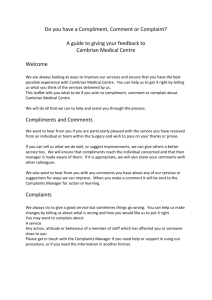
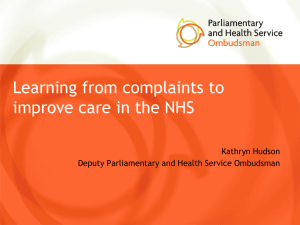
![Chapter_9[1]](http://s2.studylib.net/store/data/005745019_1-cf7106a59891cefb65717917942c12cd-300x300.png)
